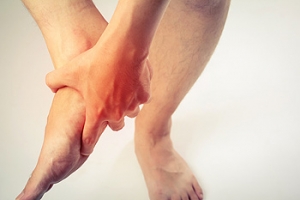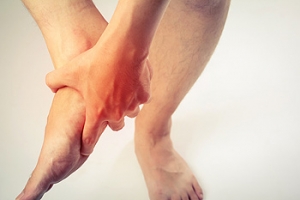Items filtered by date: June 2018
What Does Amputation Mean to a Diabetic Patient?
Recent research has shown that 60% of amputations that are not related to an injury occur in diabetic patients. The percentage rises to 80% when preceded by a foot ulcer. Infections due to diabetic foot are said to be the number one cause of leg amputations. The feet and nerves may become damaged from the high glucose levels that typically occur in diabetic patients, and this may cause a condition to occur that is referred to as neuropathy. Consequently, this may cause an inability to feel minor injuries and pain, and may ultimately lead to infections or gangrene. Many diabetics have learned that education about this condition may prevent the risk of foot ulcers and amputations. Additionally, learning how to properly care for the feet may play an essential role in possibly preventing painful foot ulcers.
Limb salvage can be an effective way in preventing the need for limb amputation. If you have diabetes, cancer, or any other condition that could lead to foot amputation if left unchecked, consult with Dr. Kenneth Donovan from Advanced Care Foot and Ankle. Our doctor will assess your condition and provide you with quality foot and ankle treatment.
What Is Limb Salvage?
Limb salvage is the attempt of saving a limb, such as the foot from amputation. Podiatrists also try to make sure that there is enough function in the foot after the salvage that it is still usable. Diabetes is the number one cause of non-traumatic amputations in the United States. Those with diabetes experience poor blood circulation, which prevents proper healing of an ulcer. If the ulcer is left uncheck, it could become infected, which could result in the need for amputation.
However, there are other causes as well, such as cancer and traumatic injury. Links between higher mortality rates and amputation have been found. This translates into higher healthcare costs, and a reduced quality of life and mobility for amputees. Podiatrists have attempted to increase the prevalence of limb salvage in an attempt to solve these issues.
Diagnosis and Treatment
Limb salvage teams have grown in recent years that utilize a number of different treatments to save the infected limb. This includes podiatrists that specialize in wound care, rehabilitation, orthotics, and surgery. Through a combination of these methods, limb salvage has been found to be an effective treatment for infected limbs, and as an alternative to amputation. Podiatrists will first evaluate the potential for limb salvage and determine if the limb can be saved or must be amputated.
If you have any questions, please feel free to contact one of our offices located in Warren, Livingston, and Toms River, NJ. We offer the newest diagnostic and treatment technologies for all your foot care needs.
What Does Amputation Mean to a Diabetic Patient?
 Recent research has shown that 60% of amputations that are not related to an injury occur in diabetic patients. The percentage rises to 80% when preceded by a foot ulcer. Infections due to diabetic foot are said to be the number one cause of leg amputations. The feet and nerves may become damaged from the high glucose levels that typically occur in diabetic patients, and this may cause a condition to occur that is referred to as neuropathy. Consequently, this may cause an inability to feel minor injuries and pain, and may ultimately lead to infections or gangrene. Many diabetics have learned that education about this condition may prevent the risk of foot ulcers and amputations. Additionally, learning how to properly care for the feet may play an essential role in possibly preventing painful foot ulcers.
Recent research has shown that 60% of amputations that are not related to an injury occur in diabetic patients. The percentage rises to 80% when preceded by a foot ulcer. Infections due to diabetic foot are said to be the number one cause of leg amputations. The feet and nerves may become damaged from the high glucose levels that typically occur in diabetic patients, and this may cause a condition to occur that is referred to as neuropathy. Consequently, this may cause an inability to feel minor injuries and pain, and may ultimately lead to infections or gangrene. Many diabetics have learned that education about this condition may prevent the risk of foot ulcers and amputations. Additionally, learning how to properly care for the feet may play an essential role in possibly preventing painful foot ulcers.
Limb salvage can be an effective way in preventing the need for limb amputation. If you have diabetes, cancer, or any other condition that could lead to foot amputation if left unchecked, consult with Dr. Kenneth Donovan from Advanced Care Foot and Ankle. Our doctor will assess your condition and provide you with quality foot and ankle treatment.
What Is Limb Salvage?
Limb salvage is the attempt of saving a limb, such as the foot from amputation. Podiatrists also try to make sure that there is enough function in the foot after the salvage that it is still usable. Diabetes is the number one cause of non-traumatic amputations in the United States. Those with diabetes experience poor blood circulation, which prevents proper healing of an ulcer. If the ulcer is left uncheck, it could become infected, which could result in the need for amputation.
However, there are other causes as well, such as cancer and traumatic injury. Links between higher mortality rates and amputation have been found. This translates into higher healthcare costs, and a reduced quality of life and mobility for amputees. Podiatrists have attempted to increase the prevalence of limb salvage in an attempt to solve these issues.
Diagnosis and Treatment
Limb salvage teams have grown in recent years that utilize a number of different treatments to save the infected limb. This includes podiatrists that specialize in wound care, rehabilitation, orthotics, and surgery. Through a combination of these methods, limb salvage has been found to be an effective treatment for infected limbs, and as an alternative to amputation. Podiatrists will first evaluate the potential for limb salvage and determine if the limb can be saved or must be amputated.
If you have any questions, please feel free to contact one of our offices located in Warren, Livingston, and Toms River, NJ . We offer the newest diagnostic and treatment technologies for all your foot care needs.
Are Swollen Feet and Ankles Normal During Pregnancy?
Many women often experience swollen feet and ankles during their pregnancy. This is commonly referred to as edema. Generally, the swelling is a result of the excess fluid in the body caused by the developing fetus and may become severe during the third trimester. There are several ways to reduce any swelling that may develop in the feet and ankles, including stretching the legs as often as possible, elevating the feet, and limiting standing for extended periods of time. Research has shown that it may be beneficial to lie on the left side while sleeping in addition to consuming plenty of fresh water, which may help to avoid dehydration. It's suggested to speak with a podiatrist who can answer any questions you may have regarding any severe swelling in your feet.
Pregnant women with swollen feet can be treated with a variety of different methods that are readily available. For more information about other cures for swollen feet during pregnancy, consult with Dr. Kenneth Donovan from Advanced Care Foot and Ankle. Our doctor will attend to all of your foot and ankle needs.
What Foot Problems Can Arise During Pregnancy?
One problem that can occur is overpronation, which occurs when the arch of the foot flattens and tends to roll inward.
This can cause pain and discomfort in your heels while you’re walking or even just standing up, trying to support your baby.
Another problem is edema, or swelling in the extremities. This often affects the feet during pregnancy but tends to occur in the later stages.
How Can I Keep My Feet Healthy During Pregnancy?
- Wearing orthotics can provide extra support for the feet and help distribute weight evenly
- Minimize the amount of time spent walking barefoot
- Wear shoes with good arch support
- Wear shoes that allow for good circulation to the feet
- Elevate feet if you experience swelling
- Massage your feet
- Get regular, light exercise, such as walking, to promote blood circulation to the feet
If you have any questions please feel free to contact one of our offices located in Warren, Livingston, and Toms River, NJ. We offer the newest diagnostic and treatment technologies for all your foot and ankle needs.
Are Swollen Feet and Ankles Normal During Pregnancy?
 Many women often experience swollen feet and ankles during their pregnancy. This is commonly referred to as edema. Generally, the swelling is a result of the excess fluid in the body caused by the developing fetus and may become severe during the third trimester. There are several ways to reduce any swelling that may develop in the feet and ankles, including stretching the legs as often as possible, elevating the feet, and limiting standing for extended periods of time. Research has shown that it may be beneficial to lie on the left side while sleeping in addition to consuming plenty of fresh water, which may help to avoid dehydration. It's suggested to speak with a podiatrist who can answer any questions you may have regarding any severe swelling in your feet.
Many women often experience swollen feet and ankles during their pregnancy. This is commonly referred to as edema. Generally, the swelling is a result of the excess fluid in the body caused by the developing fetus and may become severe during the third trimester. There are several ways to reduce any swelling that may develop in the feet and ankles, including stretching the legs as often as possible, elevating the feet, and limiting standing for extended periods of time. Research has shown that it may be beneficial to lie on the left side while sleeping in addition to consuming plenty of fresh water, which may help to avoid dehydration. It's suggested to speak with a podiatrist who can answer any questions you may have regarding any severe swelling in your feet.
Pregnant women with swollen feet can be treated with a variety of different methods that are readily available. For more information about other cures for swollen feet during pregnancy, consult with Dr. Kenneth Donovan from Advanced Care Foot and Ankle. Our doctor will attend to all of your foot and ankle needs.
What Foot Problems Can Arise During Pregnancy?
One problem that can occur is overpronation, which occurs when the arch of the foot flattens and tends to roll inward. This can cause pain and discomfort in your heels while you’re walking or even just standing up, trying to support your baby.
Another problem is edema, or swelling in the extremities. This often affects the feet during pregnancy but tends to occur in the later stages.
How Can I Keep My Feet Healthy During Pregnancy?
- Wearing orthotics can provide extra support for the feet and help distribute weight evenly
- Minimize the amount of time spent walking barefoot
- Wear shoes with good arch support
- Wear shoes that allow for good circulation to the feet
- Elevate feet if you experience swelling
- Massage your feet
- Get regular, light exercise, such as walking, to promote blood circulation to the feet
If you have any questions please feel free to contact one of our offices located in Warren, Livingston, and Toms River, NJ . We offer the newest diagnostic and treatment technologies for all your foot and ankle needs.
Reminder: When Was the Last Time…?
Custom orthotics, or shoe inserts, should be periodically replaced. Orthotics must fit properly to give you the best results. Protect your feet and ankles!
Causes of Neuropathy in the Feet
The most common type of neuropathy in the feet is referred to as peripheral neuropathy. The brain receives signals from the peripheral nerves and if this ceases to occur, these nerves may be damaged. This condition is frequently observed in diabetics and in patients who have circulation disorders. Additional causes of this ailment may include poor eating habits, alcoholism, and possibly toxic chemical exposure. Symptoms of neuropathy in the feet may include a burning and tingling sensation in the toes and the feet may gradually become numb. Walking may become affected in addition to experiencing difficulty in performing daily activities. A podiatrist can provide a proper diagnosis as well as determining the severity of this condition.
Neuropathy
Neuropathy can be a potentially serious condition, especially if it is left undiagnosed. If you have any concerns that you may be experiencing nerve loss in your feet, consult with Dr. Kenneth Donovan from Advanced Care Foot and Ankle. Our doctor will assess your condition and provide you with quality foot and ankle treatment for neuropathy.
What Is Neuropathy?
Neuropathy is a condition that leads to damage to the nerves in the body. Peripheral neuropathy, or neuropathy that affects your peripheral nervous system, usually occurs in the feet. Neuropathy can be triggered by a number of different causes. Such causes include diabetes, infections, cancers, disorders, and toxic substances.
Symptoms of Neuropathy Include:
- Numbness
- Sensation loss
- Prickling and tingling sensations
- Throbbing, freezing, burning pains
- Muscle weakness
Those with diabetes are at serious risk due to being unable to feel an ulcer on their feet. Diabetics usually also suffer from poor blood circulation. This can lead to the wound not healing, infections occurring, and the limb may have to be amputated.
Treatment
To treat neuropathy in the foot, podiatrists will first diagnose the cause of the neuropathy. Figuring out the underlying cause of the neuropathy will allow the podiatrist to prescribe the best treatment, whether it be caused by diabetes, toxic substance exposure, infection, etc. If the nerve has not died, then it’s possible that sensation may be able to return to the foot.
Pain medication may be issued for pain. Electrical nerve stimulation can be used to stimulate nerves. If the neuropathy is caused from pressure on the nerves, then surgery may be necessary.
If you have any questions, please feel free to contact one of our offices located in Warren, Livingston, and Toms River, NJ . We offer the newest diagnostic and treatment technologies for all your foot care needs.
Causes of Neuropathy in the Feet
 The most common type of neuropathy in the feet is referred to as peripheral neuropathy. The brain receives signals from the peripheral nerves and if this ceases to occur, these nerves may be damaged. This condition is frequently observed in diabetics and in patients who have circulation disorders. Additional causes of this ailment may include poor eating habits, alcoholism, and possibly toxic chemical exposure. Symptoms of neuropathy in the feet may include a burning and tingling sensation in the toes and the feet may gradually become numb. Walking may become affected in addition to experiencing difficulty in performing daily activities. A podiatrist can provide a proper diagnosis as well as determining the severity of this condition.
The most common type of neuropathy in the feet is referred to as peripheral neuropathy. The brain receives signals from the peripheral nerves and if this ceases to occur, these nerves may be damaged. This condition is frequently observed in diabetics and in patients who have circulation disorders. Additional causes of this ailment may include poor eating habits, alcoholism, and possibly toxic chemical exposure. Symptoms of neuropathy in the feet may include a burning and tingling sensation in the toes and the feet may gradually become numb. Walking may become affected in addition to experiencing difficulty in performing daily activities. A podiatrist can provide a proper diagnosis as well as determining the severity of this condition.
Neuropathy
Neuropathy can be a potentially serious condition, especially if it is left undiagnosed. If you have any concerns that you may be experiencing nerve loss in your feet, consult with Dr. Kenneth Donovan from Advanced Care Foot and Ankle. Our doctor will assess your condition and provide you with quality foot and ankle treatment for neuropathy.
What Is Neuropathy?
Neuropathy is a condition that leads to damage to the nerves in the body. Peripheral neuropathy, or neuropathy that affects your peripheral nervous system, usually occurs in the feet. Neuropathy can be triggered by a number of different causes. Such causes include diabetes, infections, cancers, disorders, and toxic substances.
Symptoms of Neuropathy Include:
- Numbness
- Sensation loss
- Prickling and tingling sensations
- Throbbing, freezing, burning pains
- Muscle weakness
Those with diabetes are at serious risk due to being unable to feel an ulcer on their feet. Diabetics usually also suffer from poor blood circulation. This can lead to the wound not healing, infections occurring, and the limb may have to be amputated.
Treatment
To treat neuropathy in the foot, podiatrists will first diagnose the cause of the neuropathy. Figuring out the underlying cause of the neuropathy will allow the podiatrist to prescribe the best treatment, whether it be caused by diabetes, toxic substance exposure, infection, etc. If the nerve has not died, then it’s possible that sensation may be able to return to the foot.
Pain medication may be issued for pain. Electrical nerve stimulation can be used to stimulate nerves. If the neuropathy is caused from pressure on the nerves, then surgery may be necessary.
If you have any questions, please feel free to contact one of our offices located in Warren, Livingston, and Toms River, NJ . We offer the newest diagnostic and treatment technologies for all your foot care needs.
Mariners’ Dee Gordon Suffers Broken Toe
Mariners’ second baseman Dee Gordon was seen fielding ground balls before the team’s series opener with the Twins. This is major news for the Mariners, a team who was without Gordon after he suffered a broken toe injury.
In regards to the injury, team manager Scott Servais mentioned, “He won't do any hard running or anything for a few days. But he's feeling better.” Gordon has been wearing a walking boot recently in order to keep pressure off of his right foot. He initially suffered the injury after being hit by a foul ball; the injury was aggravated when he attempted to make a diving catch of a bloop single in shallow right field.
Broken toes may cause a lot of pain and should be treated as soon as possible. If you have any concerns about your feet, contact Dr. Kenneth Donovan from Advanced Care Foot and Ankle. Our doctor will treat your foot and ankle needs.
What Is a Broken Toe?
A broken toe occurs when one or more of the toe bones of the foot are broken after an injury. Injuries such as stubbing your toe or dropping a heavy object on it may cause a toe fracture.
Symptoms of a Broken Toe
- Swelling
- Pain (with/without wearing shoes)
- Stiffness
- Nail Injury
Although the injured toe should be monitored daily, it is especially important to have a podiatrist look at your toe if you have severe symptoms. Some of these symptoms include worsening or new pain that is not relieved with medication, sores, redness, or open wounds near the toe.
If you have any questions, please feel free to contact one of our offices located in Warren, Livingston, and Toms River, NJ. We offer the newest diagnostic and treatment technologies for all your foot care needs.
Mariners’ Dee Gordon Suffers Broken Toe
 Mariners’ second baseman Dee Gordon was seen fielding ground balls before the team’s series opener with the Twins. This is major news for the Mariners, a team who was without Gordon after he suffered a broken toe injury. In regards to the injury, team manager Scott Servais mentioned, “He won't do any hard running or anything for a few days. But he's feeling better.” Gordon has been wearing a walking boot recently in order to keep pressure off of his right foot. He initially suffered the injury after being hit by a foul ball; the injury was aggravated when he attempted to make a diving catch of a bloop single in shallow right field.
Mariners’ second baseman Dee Gordon was seen fielding ground balls before the team’s series opener with the Twins. This is major news for the Mariners, a team who was without Gordon after he suffered a broken toe injury. In regards to the injury, team manager Scott Servais mentioned, “He won't do any hard running or anything for a few days. But he's feeling better.” Gordon has been wearing a walking boot recently in order to keep pressure off of his right foot. He initially suffered the injury after being hit by a foul ball; the injury was aggravated when he attempted to make a diving catch of a bloop single in shallow right field.
Broken toes may cause a lot of pain and should be treated as soon as possible. If you have any concerns about your feet, contact Dr. Kenneth Donovan from Advanced Care Foot and Ankle. Our doctor will treat your foot and ankle needs.
What Is a Broken Toe?
A broken toe occurs when one or more of the toe bones of the foot are broken after an injury. Injuries such as stubbing your toe or dropping a heavy object on it may cause a toe fracture.
Symptoms of a Broken Toe
- Swelling
- Pain (with/without wearing shoes)
- Stiffness
- Nail Injury
Although the injured toe should be monitored daily, it is especially important to have a podiatrist look at your toe if you have severe symptoms. Some of these symptoms include worsening or new pain that is not relieved with medication, sores, redness, or open wounds near the toe.
If you have any questions, please feel free to contact one of our offices located in Warren, Livingston, and Toms River, NJ . We offer the newest diagnostic and treatment technologies for all your foot care needs.











